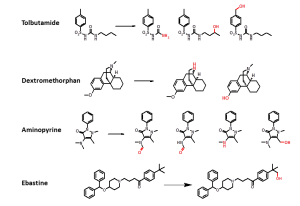In 2008, the FDA released guidance for drug metabolite safety testing (MIST), emphasizing the importance of metabolite toxicity testing in the drug development process. Indeed, drug toxicity, which accounts for roughly 40% of clinical drug failures, is a leading cause of the high drug attrition rates that have contributed to the skyrocketing drug development costs witnessed over the past few decades.
Traditionally, drug metabolites have been both difficult and hugely expensive to synthesize. Conventional methods of metabolite synthesis, such as those that employ the use of microsomes (while they have proven valuable as a predictive tool, their productive capabilities could be limited by NCE stability) or synthetic chemistry, can be extremely costly and time consuming. Consequently, drugmakers often choose to forego metabolite synthesis (and subsequent metabolite toxicity testing ) early on in the drug development process, opting instead to wait until lead compounds are further along in development before carrying out these essential functions. This decision, perceived to be a calculated risk, ultimately comes at huge price, as drug makers lose millions each year on investments in lead drug candidates that eventually turn out to be failures due to toxicity.
Biomimetic Chemistry, on the other hand, possesses the advantages of both chemistry and biology and is thus a much more efficient tool for metabolite synthesis. In fact, with biomimetic chemistry, large scale metabolite generation is enabled in one step, by mimicking and optimizing the same biotransformation reactions that occur in the liver.
BMO Kits for rapid metabolite synthesis
 BMO Kits, developed by HepatoChem, are a revolutionary way to screen, optimize and produce metabolites directly from drug candidates. The kit exploits an optimized panel of catalytic chemical reaction conditions using organometallic catalysts in a multi-well parallel format. This mimics the suite of cytochrome P450 enzymes (CYP) present in human hepatocytes, offering the researcher a unique synthetic chemical liver. This chemical liver offers the advantage of scalability of chemistry. When a reaction condition is identified, it is optimized and scaled up to produce mg quantities of metabolites.
BMO Kits, developed by HepatoChem, are a revolutionary way to screen, optimize and produce metabolites directly from drug candidates. The kit exploits an optimized panel of catalytic chemical reaction conditions using organometallic catalysts in a multi-well parallel format. This mimics the suite of cytochrome P450 enzymes (CYP) present in human hepatocytes, offering the researcher a unique synthetic chemical liver. This chemical liver offers the advantage of scalability of chemistry. When a reaction condition is identified, it is optimized and scaled up to produce mg quantities of metabolites.
BMO Kits enable you to synthesise metabolites directly from the parent drug, in three simple steps:
1) Perform the primary screen, select the desired metabolite wells
2) Perform the optimization kit; identify the best production conditions
3) Scale-up and isolate your metabolite
The HepatoChem tool, basically a chemical liver, is analogous to the panel of cytochromes P450 present in the human liver, but, as said previously, with the advantage of the scalability of chemistry. This series of easy-to-use kits is suitable for the preparation of metabolites for both MSMS and NMR.
| Product | Description | Amount |
|---|---|---|
| XTHCK1001-01 | BMO Screening Kit | 1 Kit |
| XTHCK1001-02 | BMO Optimization Kit | 1 Kit |
| XTHCK1001-03 | BMO Production Kit | 1 Kit |

Possible Biotransformation Reactions:
- Aliphatic Hydroxylation
- N- and O-Dealkylation
- N- and S-Oxidation
- Cleavage and rearrangement
- Formylation
Benefits of using the BMO Kit
- Produce drug metabolites in days, not months
- Eliminate complex and costly synthetic chemistries
- Rapid, inexpensive scale-up for NMR and in vitro testing
- Exclusive process produces large quantities of metabolites
- Convenient, room temperature reagents
- Fast & reproducible
This unique kit offers researchers a unique synthetic chemical liver. HepatoChem’s innovative technology uses biomimetic catalysts to mimic oxidative metabolism and allow for metabolite synthesis. These catalysts are as selective as microsomes or hepatocytes yet they have the advantage of enabling you to produce metabolites in milligram quantities, faster and with greater cost-effectiveness than is possible with any other available technology. More metabolism data in hand earlier in the drug development process, leads to more informed decisions.
What about your research?
Interested by BMO kits? Need more information? Just drop an e-mail to adme@tebu-bio.com
Related reading for more information
XenoTech and HepatoChem BMO Kit Poster




